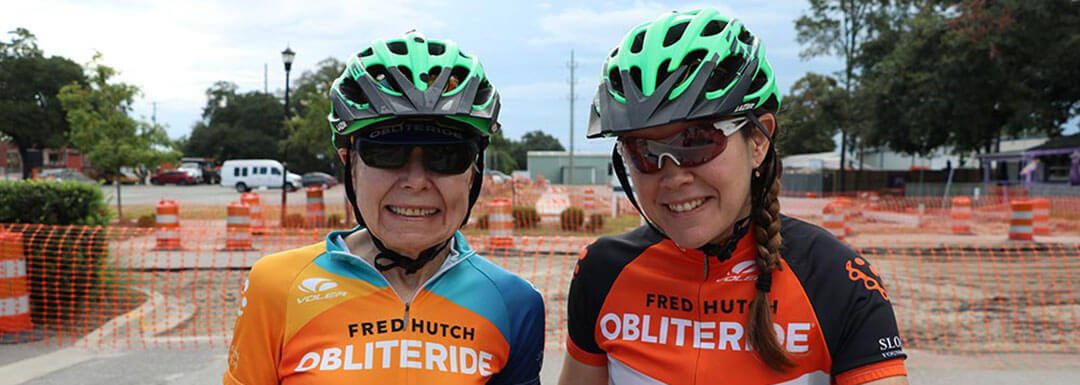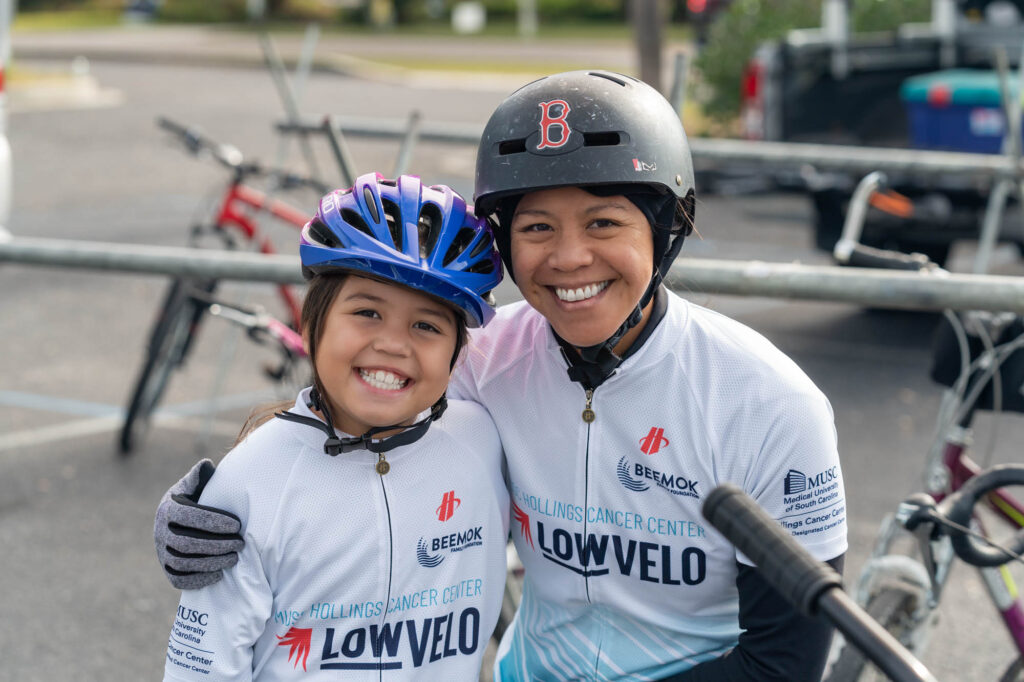MUSC Surgeon To Ride LOWVELO With Parents, Who've Both Had Cancer

Much like her parents, MUSC Health surgeon and researcher Heather Evans, M.D., is an overachiever. It’s not hard to see where she gets her drive.
Take her mom, Nancy Evans. In 2011, Nancy, at age 71, was diagnosed with cancer and began cycling.
“I wanted to buy a bike,” Nancy says. “And so after I got the diagnosis, I sat in the car outside the bike shop, and I said, ‘Now, are you going to go in there and buy a bike like you want, or are you thinking you might die next year from lymphoma?’ And I said, ‘No, I’m going to fight.’”
Nancy got her diagnosis of non-Hodgkin’s mantle cell lymphoma after noticing large lymph nodes under her arms. Her specialists at the time at the Fred Hutchinson Cancer Research Center in Seattle, Washington, recommended “watchful waiting” rather than invasive treatment, seeing no need to do a bone marrow transplant with that slow-growing form of the disease.
“I’ve never been treated, even though by now I have stage four, and I can feel lumps in all the different parts of my body. But my blood work comes back good, so they don’t treat me,” says Nancy, who’s now 79. “Anyway, so here I am. And I don’t want to give up anything that I’ve been doing for the last eight years since I was diagnosed, because whatever I’m doing is a good thing for me, so that’s why I’m still riding.”
By 2013, Nancy was riding the 50-mile route in Obliteride, an annual Seattle-based bike ride, raising money for Fred Hutchinson Cancer Research Center. Her family watched in awe as she crossed the finish line, on a Brompton folding bicycle, and they realized for the first time the magnitude of her accomplishment.
Inspired by her mother, Heather took up cycling as a way of life.
“I thought, ‘Well, I’m not gonna let my 72-year-old mom show me up,’” she says. “So, I got my bike out of storage and started riding my bike around Seattle. And I totally fell in love with it.”
The following year, mom and daughter rode 50 miles each, advancing over the years to conquer the 85-, 100- and 150-mile routes. In four Obliteride years, Heather rode her bike 450 miles to raise money for cancer research.
When Heather joined the Medical University of South Carolina a year ago, she was too busy moving from Washington state to participate in Obliteride, as she had done since 2014. That’s one reason why she was so excited to learn that this November, MUSC Hollings Cancer Center would be hosting its own bike ride, LOWVELO, to raise money for cancer research in this state.
Participating in the inaugural LOWVELO was a no-brainer for the whole crew. She and Nancy enrolled, and they expect two more family members to sign up, too. Together, they’ll ride a total of 200 miles.
A surgeon for 20 years, as well as a surgical infections researcher, Heather relocated to the Lowcountry to serve as vice chair of Clinical Research and Applied Informatics in the MUSC Department of Surgery. She previously worked at the University of Washington in Seattle on research using mobile technology to improve the care of post-op patients, focusing on the problem of surgical wound infections. Here at MUSC, she’s one of the medical directors of the Center for Telehealth, leading the initiative for remote patient monitoring, developing strategies for patients to use their mobile phones and other connected health devices to track themselves and to transmit important health data to their MUSC providers.
“So after patients have an encounter with a provider, they might be monitoring their blood glucose, because they’re diabetic, or they might be monitoring their vital signs and weight after they’ve had a cardiac procedure, sharing these data with their physicians at MUSC to guide medication management without ever leaving their homes. It might be a parent of a child with a partial thickness burn wound and have those wounds followed remotely with serial photographs to avoid frequent visits for wound care that a parent can do with some personalized instruction,” she says.
Heather says it’s an exciting field to be in. They are working on developing a platform with different kinds of serial patient-generated health data, using mobile apps to obtain survey information and pictures of wounds, and continuous monitoring sensors such as pulse oximeters, blood pressure cuffs and glucometers connected via Bluetooth to smartphones or directly to a cloud-based remote monitoring platform.
“It’s an exciting time to consider how we can move forward and expand the remote care offerings that we have for our patients, particularly as we expand our geographic reach in South Carolina with our new partner hospitals in the MUSC system.”
Such technology is a game-changer on many levels, including benefiting patients who undergo surgery for cancer. “I was on call the other night, the first day that EPIC, MUSC’s electronic medical records, went live at our regional partner hospitals. And it was really amazing, because I was looking at the patient through the EMR, just like they were downstairs in the emergency room,” Heather says. “They were halfway across the state. So, I think it’s very exciting to see that this institution has really embraced the idea that technology is something that can benefit those who aren’t just here in Charleston.”
A fan on innovation, Heather says she sees the bike ride as a creative way to raise funds to support and accelerate cancer research, a cause dear to her heart not only because of her mom.
Her father, Charles Evans, was a cancer immunologist for 25 years, joining the National Institutes of Health (NIH) to do basic science research in tumor biology focused on how people can use the body’s own defense mechanisms to fight cancer.
“He was among the first wave of basic scientists hired at the NIH at that time through the Commissioned Corps of the U.S. Public Health Service. This was part of President Nixon’s ‘War on Cancer,’ an effort that committed $100 million to find a cure for cancer.” “My dad was part of this extraordinary effort launched in 1971 – the year I was born.”
In 2004, Charles was diagnosed with bladder cancer, and he, himself, underwent immunotherapy. BCG, the vaccine for tuberculosis, was introduced into his bladder, eventually eradicating his cancer. He’s been cancer-free now for almost 20 years, nearly equal to the number of years he spent researching ways to fight cancer.
“He was one of the first people to work on immune-modulating substances produced by white blood cells called lymphocytes; leukoregulin was the molecule that he discovered,” Heather says. Another prolific researcher who arrived at the NIH around the same time as her father was surgeon scientist Steven Rosenberg, chief of surgery at the NIH Clinical Center for the past 45 years. He translated basic research discoveries to treat patients with metastatic melanoma, sarcoma and lymphoma successfully, she explains. “It’s always very important to know that we’re funding good, quality cancer research because it is a very expensive endeavor.”
This year, the family –all now based in Charleston – will support LOWVELO, and Heather and Nancy will take on the Boeing 50-mile route, raising $5,000 each for cancer research at Hollings Cancer Center. Though still in a watchful-waiting mode as far as tracking her cancer, Nancy’s training is right on track, with some September rides maxing out at 26 miles while she steadily recovers from two knee replacements since February of 2018.
“I was sad about leaving Seattle because I couldn’t ride with my two new knees this past August in Obliteride. But then before that even took place, I found out about LOWVELO, and I was so happy,” Nancy says. “My cancer care is with Dr. Hess at the MUSC Hollings Cancer Center – so I’m benefiting from whatever they do there. You know, it’s like I am putting money in a bank that’s good for me.”


